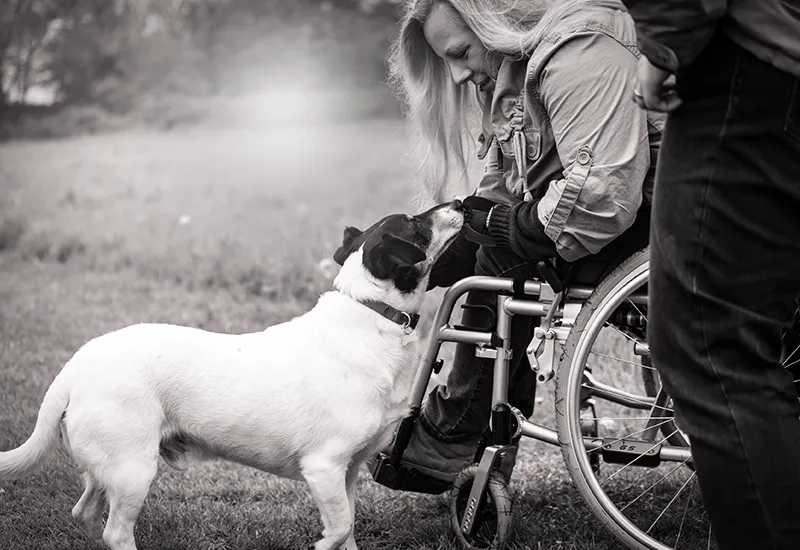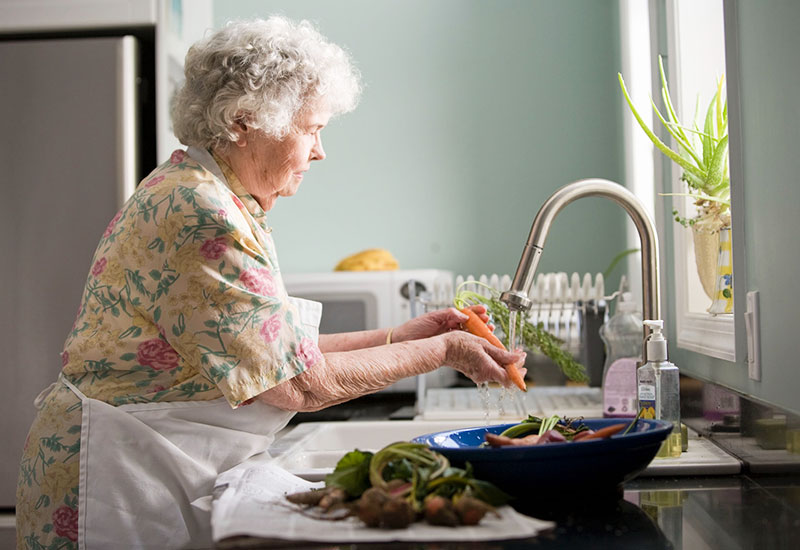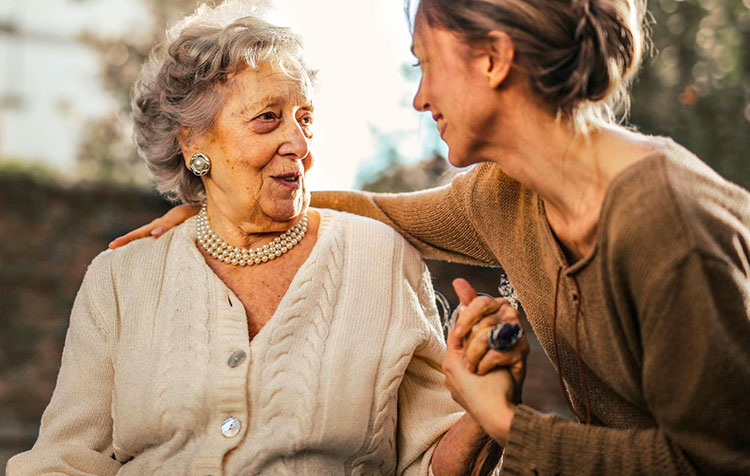Do you want to care for a relative and are looking for valuable tips on how to master this task in the best possible way? Then you've come to the right place! Caring for a family member at home can be both a beneficial enrichment and a real challenge at the same time.
As it requires physical and emotional dedication, carers are usually under a great deal of strain for a long period of time, which can have serious consequences for their own health. However, with good preparation and the right advice, you can make sure that you both get the best out of the situation.
In this article, I would therefore like to give you the best practical tips for caring for family members effectively and compassionately, while at the same time not neglecting your own well-being. Let's go!
Reasons: Why do people need care?

According to the Federal Statistical Office are in Germany 4.96 million people in need of care. Around 80 percent of them are cared for at home - also by outpatient care services, but mainly by relatives.
But why do people need or become in need of care in the first place? Why are they (no longer) able to carry out their everyday tasks and obligations independently?
The most common causes I would like to give you some advice in advance:
- Natural aging process: As we get older, our physical and mental abilities decline. Accordingly, ageing often leads to people needing care.
- Chronic diseases: Long-term illnesses such as diabetes, rheumatism, arthrosis, cardiovascular diseases or dementia are also typical causes of the need for care. The after-effects of cancer can also mean that you are no longer able to cope with everyday life without (outside) help.
- Disabilities: Congenital or acquired physical (e.g. limited walking ability), mental (e.g. alcohol addiction) or intellectual impairments (e.g. Down's syndrome) are further reasons.
- Sudden events: In the same way, the need for care can also arise completely unexpectedly. This is particularly possible after medical emergencies such as strokes, heart attacks or accidents (e.g. a car or sports accident or a fall from a roof).
- Mental illnesses: Neurological and mental illnesses such as Parkinson's disease, Alzheimer's dementia, depression or anxiety disorders are also among the possible reasons why a person is dependent on the help of others.
10 tips: What should you know if you want to care for relatives?

Each of the causes mentioned requires a very specific approach and a deep understanding of the needs of the person in need of care. If you know the exact reasons, you can ultimately respond to the individual requirements in the best possible way.
Use the following tips now to More security when caring for relatives and pass the task of "home care" with flying colors.
1. inform yourself about what to expect
You should get an idea of the situation beforehand. It is important to understand the amount of care required and to find out whether you are ready for the task. Prepare yourself mentally and practically for caring at home, ultimately reduces the likelihood of unexpected surprises and excessive burdens in everyday care.
Among other things, deal with the medical or age-related needs of your family member (e.g. care requirements, intimate care or place of care), with possible developments over time (e.g. worsening of the clinical picture) and how you react to this as confidently as possible.
Also Financial and time aspects (e.g. care allowance or the need for all-day care), you should check to prevent being overwhelmed by the task in the future.
2. adapt the diet to the respective situation
The type of diet plays a crucial role for well-being of the person in need of care. For example, certain foods can exacerbate a situation or illness, while others counteract it. However, the anticipation of a favorite meal can also have a positive effect. It is therefore important to plan meals with foresight.
The menu should nutritious and adapted to individual needs (e.g. swallowing difficulties or medical dietary recommendations) of the relative being cared for. You can prepare the food yourself or have it delivered regularly via services such as "meals on wheels".
Tip: The consumption of meat products, for example, can increase the risk of heart disease, which is why it should be included in small amounts or not at all in the diet of a person in need of care. How a heart-healthy diet in practice can be found in the linked blog article.
3. consciously take time out from caring for yourself
Caring for relatives is an honorable task, but it can also demand a lot from you. Accordingly, it is important not only to think about the well-being of others, but also to consider your not to lose sight of your own health.
The Self-care is essential, for example, in order to Burnout to avoid. What can this look like in practice? For example, plan regular breaks in which you allow yourself consciously take time for yourself. Time in which you can relax and pursue your own interests. Time out like this gives you energy and allows you to tackle your care tasks with renewed strength and a positive mindset.
Ultimately, the well-being of your family member also depends on how well you are doing as a caregiver. So treat yourself to a break every now and then and also makes use of the so-called Preventive care (vacation replacement). It ensures that someone else takes care of your family member during the respective period.
4. find out about professional support
Do you want to care for a relative? Then there are a variety of support services for people in need of care or carers that you should know about and make use of. The range extends from Care advice centers (e.g. at the DRK), outpatient care services and Health insurance companies, about Help groups and Care groups for people suffering from dementia, right up to the psychological support for family caregivers.
Ultimately, such services and offers also serve this purpose, to relieve yourself as the caregiver of your family member.
5. support only when necessary

Depending on the situation of the person in need of care, your daily tasks will include, for example Regular check-ups and visits to the doctor, the Taking medication prescribed by a doctor and wound carebut also general support with personal hygiene.
For example Showering, washing, combing, shaving or brushing your teethn your help may be needed. Of course, your support can also help in the general household - for example with the food preparation, the shopping or when cleaning and washing up.
In general, however, help should only be given when it is necessary. This is the only way to Maintaining the independence of the family member requiring care for as long as possible. This attitude will also prevent you from being personally overwhelmed or overburdened by family care.
6. use tools and offers of help from other people
Countless aids can help you as a caregiver, but also the person in need of care. How to promote Stairlifts for example the Quality of life in old age or the Everyday life in a wheelchair. Also a Care bed, positioning aids, an emergency call system and special Care apps on the smartphone can be a valuable support.
It is also important not to shy away from unselfish offers of help from the Family or from friends and neighbors to accept. For example, by having someone else drive you to the doctor's surgery every now and then, cook your meals, clean the kitchen or take on other everyday tasks, you can save yourself from excessive stress.
7. promote communication and mental engagement
Our Brain needs workso that it functions properly in the long term. If you want to care for a relative, you should therefore regularly keep them mentally occupied and challenge them a little.
For example, short training sessions Memory exercises (e.g. pantomime and guessing movements), Board games (e.g. "Mensch ärgere dich nicht") or the exercise of a Favorite hobbies (e.g. painting or crocheting).
As a general rule, you shouldn't wrap family members who need care in absorbent cotton. small household tasks (e.g. dusting).
Don't forget the value of personal conversations. They strengthen the WE feeling, promote mutual support, give Courage, hope and also support in difficult phases.
Tip: Again, it is important to always keep an eye on your own health. In line with this, I can recommend the following blog post about mental regeneration recommend. Use it to learn to really switch off your brain and recover quickly in stressful phases.
8. apply for grants and have your costs reimbursed
Conversion measures, co-payments for medication, costs for aids and travel to the doctor's surgery: caring for relatives is not a cheap pleasure and can put a noticeable strain on your wallet.
You should therefore find out about state subsidies and health insurance benefits and take advantage of them. Monthly care allowance (amount depends on the respective care level), Reimbursement of travel expenses, Subsidies for aids, tax advantages and Reimbursements for care expenses take some of the financial pressure off you and certainly make your everyday life in private care a little more relaxed.
9. reconcile work and care
Especially when a family member is completely Suddenly in need of care When the work-life balance becomes a real challenge for everyone involved.
For such cases, there is the so-called Short-term inability to workwhere you as the carer can take 10 days off work to sort out the most important things. During this time, you will also receive the Care support allowance. The Care time This allows you to take up to 6 months off to care for your relative - anything longer than this is the Family care time.
Flexible working models (e.g. home office or part-time work) may also make it easier for you to reconcile caring for relatives and/or part-time work. You should talk openly and honestly with your boss about your individual options.
10. ensure exercise and fresh air

Our bodies are made to move. That's why regular physical activity also contributes significantly to long-term mobility and health, grow old healthy. Bedriddenness, on the other hand, means that the Circulation weakened and muscles broken down becomes. This will make it even harder to ever really "get going" again.
An important tip for home caregivers is therefore, within the scope of possibilities to ensure that the family member requiring care gets as much exercise as possible every day.
Depending on the situation, this may involve, for example, repeated Get up from the lying position, Short walks, light gymnastic exercises or Assisted walking exercises a good workout. Also use the appropriate aids for this. (e.g. a rollator or walking stick)
If possible, the movement should also outside in the fresh air (e.g. in the park or garden). The natural light strengthens the immune system and also the inhaled oxygen promotes the energy level of the person in need of care. Last but not least, the people around you The sounds of nature are really relaxing - also for you as a caregiver.
Caring for loved ones and not forgetting yourself
Caring for a dependent family member at home is an honorable task. In this article, you have learned many tips that can help you master the challenges of everyday caregiving without jeopardizing your own well-being.
Even if it can be stressful from time to time, you should never forget that it also holds many precious moments together.
"Anyone who keeps the ability to see beauty never grows old."
Franz Kafka (more under Age Quotes)
I very much hope that this advice will help you. Do you have any questions, your own experiences or additional tips that you would like to share? Then I look forward to your comment.
Stay caring and patient,

PS: Sooner or later, we will all grow old and frail - and have to deal with death. Until then, it's important to enjoy the time we have. That's why I've put together a few things that Dying people often regret at the end of their lives. Use them as motivation for a truly fulfilling life 🙂









